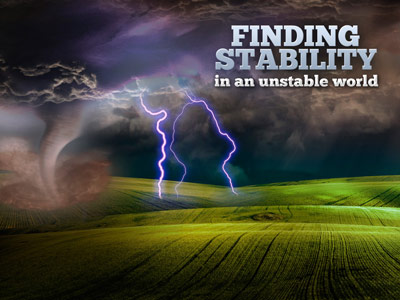-
Crisscross Double Cross Series
Contributed by Peter Loughman on Feb 24, 2009 (message contributor)
Summary: We are secure in our faith. John tells us that those who walk away from the faith were never a part of the faith to begin with.
In 1936, when delays slowed construction, over $130,000 was invested in a novel safety feature: a vast net -- similar to a circus net -- suspended under the Golden Gate Bridge. The safety net extended ten feet wider than the bridge’s width and fifteen feet further than the roadway’s length. It gave workers an abiding sense of security and so the workers moved more freely -- and quickly -- across the slippery, half-constructed steel. "There’s no doubt the work went faster because of the net," said Lefty Underkoffler, one of the many workers who constructed the bridge. Some workers felt quite safe about the innovation, so much so, that they had to be threatened with dismissal so they wouldn’t dive into the net for thrills.
Security. The workers did their job with more confidence knowing that if worse came to worse, they were going to be OK. We as Christian live out our faith very differently if we know that our faith is secure. If I know that my faith is secure I will stretch my faith more willingly, I will confess my sins more freely and I will be able to start over with more confidence knowing that my faith is secure.
John has been teaching us about a practical faith, He has shown us that we place our faith not in a thing, but in a person, specifically, the person of Jesus Christ; John has shown us that sin matters in our relationship with God and so we need to be vigilant of our sin. John has also given us a couple of ways to analyze our Christian walk - one was the fact that a Christian takes their own sin seriously and the other was that when we love our brothers and sisters in Christ it shows the depth of our faith.
Today John teaches us about the security of our faith. John tells us that those who walk away from the faith were never a part of the faith to begin with - Yet John encourages us, He tells us that our faith is real, so real that we are literally anointed with God Himself.
Before John speaks of the security of our faith, John warns us about loving the world starting in verse 15. The word John uses here for world has two basic meanings: One, the created universe and two, human society - which is temporarily under the control of evil, which is, organized opposition to God. It is this latter meaning that John is using here. He is thinking of the source of opposition to God, not the material universe. So when John tells us not to love the world he is speaking more in terms of Christians living in a society that is not Christian.
Now at first glance we might think that John means we are to turn our back on anything that is produced in the world. We may read this and take it to mean that we are to refuse to see movies, listen to opera, back away from any kind of art or refuse to be involved in any kind of sports. We can make up a long list of things not to be involved in, but that is not what John is talking about here. John is not saying that we are to not participate in the world. So in verse 16, John defines what the world is by giving us a couple of examples so that we will not be confused, cravings, lust of the eyes and boasting.
First off we need to remember John has been telling us that the right behavior must follow right belief. The desires John has in mind are ethically wrong. Note that he says these things are not from the Father, meaning that they are not of God. Desire for pleasure is not wrong in itself, that is not what John is talking about here. John wants us to note that not only doing unethical things is wrong, but wanting to do them is wrong also. Also, John speaks of the eyes as lustful for in the ancient world it was generally accepted that the beginning of unethical behavior, for we see with the eyes what we want and then the unethical behavior follows.
John’s first two examples seem pretty obvious, but the third, “boasting of what he has and does”, what does that mean? John is trying to say that - pride in one’s lifestyle is wrong. In other words if I glow in my accomplishments and boast about what I have done, I am elevating myself over what God has done in my life. This kind of boasting is ultimately empty and it shows the condition of my heart. It is a form of false estimate of the value of worldly possessions and attitudes, it a claim of self sufficiency, without God. When we boast in what we have done, it is really an empty thing for John says these things we value so much, really have little value and will all pass away.

 Sermon Central
Sermon Central



